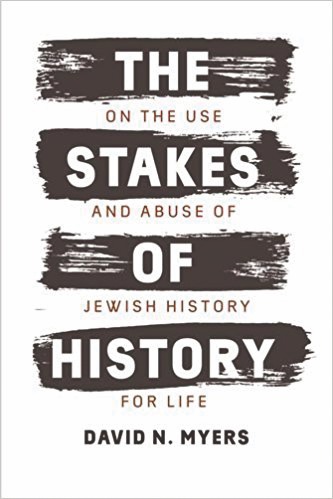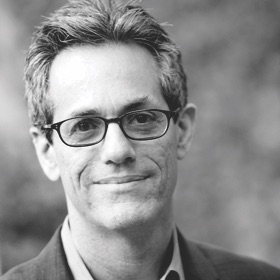
“The Stakes of History: On the Use and Abuse of Jewish History for Life” by David N. Myers (Yale University Press) comes at a moment “beset by its own anxiety,” as the author puts it, “over the worth and meaning not only of history but of humanistic inquiry more generally.”
Myers is not explicitly referring to the rancor that has tainted our public discourse — a phenomenon that he knows well and from personal experience — but to the deeper trends of economic stress, declining college enrollments, and institutional retrenchment that have prompted a reconsideration of what we actually can learn by studying history. But Myers is an optimist at heart, and he insists that he remains “bullish” on both the necessity and the rewards of the search for historical truth.
“Rather than succumb to the despair of the moment, I remained more convinced than ever that historical knowledge and perspective were the necessary ingredients in understanding the world we live in,” he writes, “and were capable of playing a constructive (though not risk free) role in the wider world.” His self-declared goal is to find a “serviceable vision of history” — that is, not only “getting the facts right” but also making use of historical facts to “draw inspiration, motivation, and clear direction from the past.”
Myers is the president and CEO of the Center for Jewish History in New York and the Sady and Ludwig Kahn Professor of Jewish History at UCLA. His book is based on the remarks he delivered in 2014 as a participant in the highly regarded Rosenzweig Lectures in Jewish Theology and History, which are sponsored by the Program in Judaic Studies at Yale.
History can be abused, Myers points out, and he warns us against those who manipulate, distort and falsify history to justify some goal other than the pursuit of facts. He quotes medievalist Patrick Geary for the proposition that the misuse of history “has turned our understanding of the past into a toxic waste dump, filled with the poison of ethnic nationalism, and the poison has seeped deep into popular consciousness.”

“Rather than succumb to the despair of the moment, I remained more convinced than ever that historical knowledge and perspective were the necessary ingredients in understanding the world we live in.” — David N. Myers
Above all, Myers wants his readers and his fellow historians to be mindful of the “porous boundary between history and memory.” The study of history is (or ought to be) based on hard data, but the human memory is soft-edged and malleable. And the rich collective memory of the Jewish people, which includes the tales passed from generation to generation in the form of myth and legend, folklore and song, only further blurs the line between history and memory. So we are confronted with “a deep chasm between the rich fabric of premodern collective memory and the sober quality of modern critical history.”
The tension between history and memory is especially acute in Jewish tradition. Simon Dubnow, one of the giants of Jewish historical scholarship, pointed out that Jewish tradition has produced a vast library of books but, until the 19th century, few of them could be called history books. “We have sinned against history,” Dubnow wrote. “The time has come to release it and to reconstruct the remains of its ruins.” Even at the moment of his death during the Holocaust, Dubnow is said to have cried out: “Yidn, shraybt un farshraybt!” (Jews, write and record!).
Exactly here, by the way, is an example of the gap that can open between history and memory. Myers, a careful and disciplined historian, pauses to acknowledge that “[m]ultiple accounts of [Dubnow’s] death exist,” the most heartbreaking of which is that he was shot by a German soldier who had once been his student in Heidelberg. “[T]his former student, Johann Siebert, would boast to Dubnow about the number of Jews that had been liquidated each day, to which Dubnow, who was working without cease, would retort, ‘I will record it all.’ ” And Myers finds himself compelled to characterize the dying words of Simon Dubnow as “a legend.”
Still, as a stirring and superbly well-documented exemplar of how Dubnow’s charge was carried out, Myers singles out the Oyneg Shabbes project, “surely one of the clearest instances of historical research in extremis ever recorded.” Under the leadership of Emanuel Ringelblum, a task force that included not only historians and journalists but even young children gathered and preserved thousands of pages of documentary evidence of what actually happened in the Warsaw Ghetto between 1939 and 1942. Myers praises Ringelblum’s “unyielding devotion to history as a vital medium of truth,” and reminds us that “[h]e and his colleagues harbored the hope that history would serve as an ultimate vindication of the triumph of good over evil.”
“The Stakes of History” is a survey of the work of Jewish historians over several centuries, but Myers insists that “it is in confronting the criminal legacy of the Holocaust that historians — and history — have most directly assumed center stage in seeking justice and planting seeds of memory.” The statement is literally true; after all, Deborah Lipstadt was sued for libel by David Irving on the basis of what could be fairly described as a debate between two historians. Lipstadt’s legal defense was based on proving that “David Irving had repeatedly falsified the historical record in his dozens of books on the history of Germany during the war.” Here was another moment of crisis in the study of history. A verdict in favor of Irving would have been a verdict in favor of Holocaust denial. “This prospect exposed both the fragility and the strength of history,” Myers writes.
Myers concludes that “fastidious attention to sources and concern for veracity” are the “professional tools” of the historian, but he also insists that they “need not be at odds with the goal of planting the seeds of memory for future generations.” Indeed, he argues that they can be used “to liberate, to console, and provide witness.” And he declares that he, like the other historians he describes, are “committed to the proposition that history could and must serve life.”
Jonathan Kirsch, author and publishing attorney, is the book editor of the Jewish Journal.























 More news and opinions than at a Shabbat dinner, right in your inbox.
More news and opinions than at a Shabbat dinner, right in your inbox.